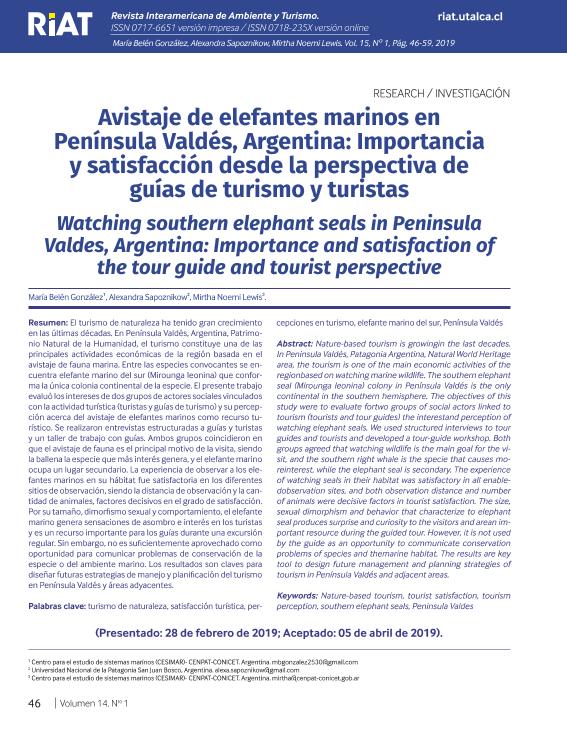Artículo
El turismo de naturaleza ha tenido gran crecimiento en las últimas décadas. En Península Valdés, Argentina, Patrimonio Natural de la Humanidad, el turismo constituye una de las principales actividades económicas de la región basada en el avistaje de fauna marina. Entre las especies convocantes se encuentra el elefante marino del sur (Mirounga leonina) que conforma la única colonia continental de la especie. El presente trabajo evaluó los intereses de dos grupos de actores sociales vinculados con la actividad turística (turistas y guías de turismo) y su percepción acerca del avistaje de elefantes marinos como recurso turístico. Se realizaron entrevistas estructuradas a guías y turistas y un taller de trabajo con guías. Ambos grupos coincidieron en que el avistaje de fauna es el principal motivo de la visita, siendo la ballena la especie que más interés genera, y el elefante marino ocupa un lugar secundario. La experiencia de observar a los elefantes marinos en su hábitat fue satisfactoria en los diferentes sitios de observación, siendo la distancia de observación y la cantidad de animales, factores decisivos en el grado de satisfacción.Por su tamaño, dimorfismo sexual y comportamiento, el elefante marino genera sensaciones de asombro e interés en los turistas y es un recurso importante para los guías durante una excursión regular. Sin embargo, no es suficientemente aprovechado como oportunidad para comunicar problemas de conservación de la especie o del ambiente marino. Los resultados son claves para diseñar futuras estrategias de manejo y planificación del turismo en Península Valdés y áreas adyacentes. Nature-based tourism is growingin the last decades. In Peninsula Valdés, Patagonia Argentina, Natural World Heritage area, the tourism is one of the main economic activities of the regionbased on watching marine wildlife. The southern elephant seal (Mirounga leonina) colony in Península Valdés is the only continental in the southern hemisphere. The objectives of this study were to evaluate fortwo groups of social actors linked to tourism (tourists and tour guides) the interestand perception of watching elephant seals. We used structured interviews to tour guides and tourists and developed a tour-guide workshop. Both groups agreed that watching wildlife is the main goal for the visit, and the southern right whale is the specie that causes moreinterest, while the elephant seal is secondary. The experience of watching seals in their habitat was satisfactory in all enabledobservation sites, and both observation distance and number of animals were decisive factors in tourist satisfaction. The size, sexual dimorphism and behavior that characterize to elephant seal produces surprise and curiosity to the visitors and arean important resource during the guided tour. However, it is not used by the guide as an opportunity to communicate conservation problems of species and themarine habitat. The results are key tool to design future management and planning strategies of tourism in Península Valdés and adjacent areas.
Avistaje de elefantes marinos en Península Valdés, Argentina: Importancia y satisfacción desde la perspectiva de guías de turismo y turistas
Título:
Watching southern elephant seals in Peninsula Valdes, Argentina: Importance and satisfaction of the tour guide and tourist perspective
Fecha de publicación:
04/2019
Editorial:
Universidad de Talca. Facultad de Economía y Negocios
Revista:
Revista Interamericana de Ambiente y Turismo
ISSN:
0717-6651
e-ISSN:
0718-235X
Idioma:
Español
Tipo de recurso:
Artículo publicado
Clasificación temática:
Resumen
Archivos asociados
Licencia
Identificadores
Colecciones
Articulos(CESIMAR)
Articulos de CENTRO PARA EL ESTUDIO DE SISTEMAS MARINOS
Articulos de CENTRO PARA EL ESTUDIO DE SISTEMAS MARINOS
Articulos(SEDE CENTRAL)
Articulos de SEDE CENTRAL
Articulos de SEDE CENTRAL
Citación
González, María Belén; Sapoznikow, Alexandra; Lewis, Mirtha Noemi; Avistaje de elefantes marinos en Península Valdés, Argentina: Importancia y satisfacción desde la perspectiva de guías de turismo y turistas; Universidad de Talca. Facultad de Economía y Negocios; Revista Interamericana de Ambiente y Turismo; 15; 1; 4-2019; 46-59
Compartir
Altmétricas




